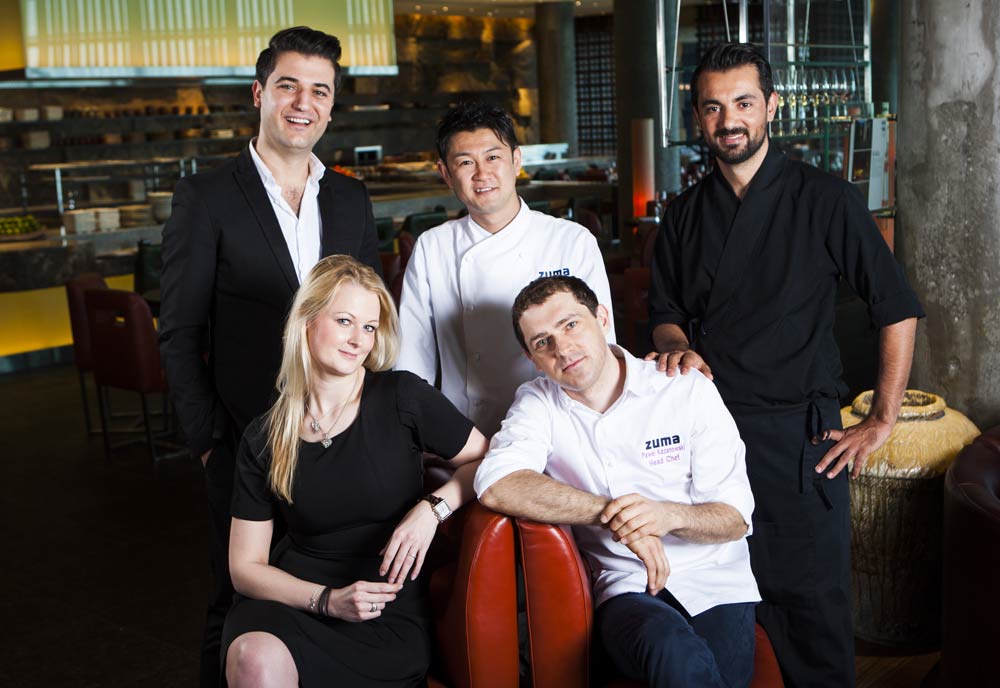 Inside the new Zuma Abu Dhabi at Al Maryah Island which follows the style brief by Rainer Becker of using natural materials, followed by Tokyo-based designer Noriyoshi Muramatsu from Studio Glitt.
Inside the new Zuma Abu Dhabi at Al Maryah Island which follows the style brief by Rainer Becker of using natural materials, followed by Tokyo-based designer Noriyoshi Muramatsu from Studio Glitt.
Zuma and Roka founder Rainer Becker in an exclusive conversation with Caterer Middle East on what makes him tick and the strategy behind his restaurants
Following directions to Zuma’s Abu Dhabi outpost is easy — but what I don’t expect when I get there is to see a wooden box that says “Zuma” on it staring at me (later Zuma managing director Middle East & Turkey Ajaz Sheikh refers to this design as the “Apple of restaurants”).
Where’s the restaurant, I wonder? I push the door open and walk inside a large, square room and see steps going down. I follow the path, like Dorothy on the yellow brick road. At the foot, I find a large cavernous space overlooking the waters lapping against Al Maryah Island. I am inside the second Zuma in the UAE, and I am here to meet the man behind the wildly successful Japanese brand: Rainer Becker.

| Advertisement |
The chef-turned-restaurateur fell in love with Japanese food after spending six years in Tokyo, and says: “Japanese cuisine looks very simple on the outside but it’s very complex. That fascinated me over the years.”
Becker was in the UAE towards the end of February 2014 for the launch of Zuma Abu Dhabi, which is a special one as it marks the first instance in which two Zuma locations have been within an hour’s drive of each other, according to Sheikh.
Flashback eight years ago when Becker first stepped foot in Dubai, and he is candid that he wasn’t confident about whether it was the right place for the brand.
However, when he saw DIFC, he says he took a “calculated risk”. “Yes it was a risk, but the feeling of a location is important. And I got a good feeling for DIFC. I think calculated risks are important; I knew DIFC had a lot of offices, so naturally there was the lunch trade, and then the feel factor was there.”
After Zuma saw success in Dubai, there were clamours from Abu Dhabi customers to open one in the capital. Becker says this time around he was slightly surer about the move. “I compare Abu Dhabi to what Dubai was many years ago. It’s an evolving city, and it’s amazing what is happening here.”
While discussing the location of Zuma Abu Dhabi at Sowwah Square, Becker reveals the strategist behind his restaurateur persona. He explains: “The financial centre in Dubai has been very, very good to us. We looked at several sites here, but I felt very comfortable with a financial centre again because it gives you a secured lunch business.
“That’s very important because Zuma is a very expensive concept to run — it’s very labour-intensive. You have open kitchens so you need to always have a presence. Now if you have lunch trade, it gives you a plus point: if you like it for lunch, you might want to bring your friends in the evening.”
Becker has a gut feeling the concept will work well in Abu Dhabi and discounts the notion that it’s still too early to predict that. He says: “It’s still early days but it was also early days when we arrived in DIFC.” He recounts an evening when he was in the DIFC venue just after it launched and the restaurant was empty at 7:30pm. “I got a bit scared! And look at what it is now.”
Article continues on next page ...









 Search our database of more than 2,700 industry companies
Search our database of more than 2,700 industry companies









